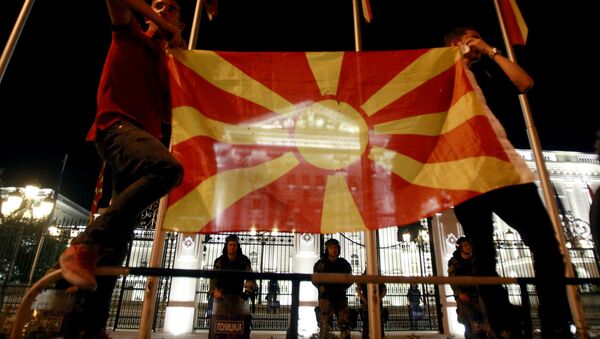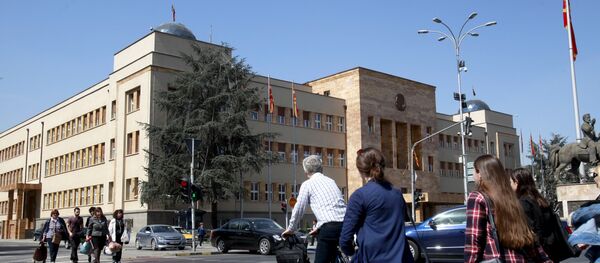The Republic of Macedonia is once again mired in a political crisis, the country's third in as many years. The author covered the first one in 2015 and its sequel the year after in two of his Sputnik articles, so the reader should check them out if they need a background briefing about the specifics. To be concise, the US has been experimenting with a new political technology in the country, relying on the strategic leaking of manipulated and illegally procured wiretaps on Macedonian politicians, journalists, and private citizens in order stoke Color Revolution unrest against the government with the aim of destabilizing it and thus offsetting Russia and China's Balkan megaprojects of the Balkan/Turkish Stream gas pipeline and Balkan Silk Road high-speed railway, respectively, which are planned to crucially transit through the landlocked country.
Background Briefing
Macedonia has a very sizeable Albanian minority, though the exact figures are disputable because the most recent census figures are from 2002. At the time that the Ohrid Framework Agreement (OFA) was signed in 2001, it was thought that approximately a quarter of all Macedonians were Albanian, though there are still concerns that even that number was inflated by the hundreds of thousands of Albanians which flooded into the country during the 1999 NATO War on Yugoslavia. OFA helped Macedonia narrowly avoid another repeat of the Kosovo scenario in violently carving out the World War II fascist-driven project of so-called "Greater Albania", and it guaranteed Albanians proportional representation in the country's government and society.
It's here where US Ambassador Jess Baily importantly comes into play.
Baily's Games
It's widely suspected that Ambassador Baily was instrumental in getting the Albanian minority to rally around SDSM instead of their traditional ethno-centric political parties, as has usually been the case in the country's post-Ohrid electoral history. This contributed to SDSM nearly winning the December parliamentary vote, much to the surprise of all observers who had discounted that possibility since they presumed that the Albanians would stick with their own political parties instead of switch over to SDSM. VMRO barely won the election, but wasn't able to form a government because its usual Albanian coalition partner, the Democratic Union for Integration (DUI), stubbornly refused to work with the incumbent authorities unless they conceded to the radical demands of the so-called "Albanian Platform".
All of this is threatening enough as it is, but it's all the more dangerous because Zaev hinted during the campaign that he would liberally interpret the OFA in order to give Albanians "more rights" if he wins, which some observers interpreted as a dog whistle to indicate his support for "Greater Albania" through the introduction of nationwide bilingualism and then later on the country's "federalization" (internal partition). Even worse, it's understood that these two steps would eventually come to involve a revision of the country's constitutional name from the Republic of Macedonia in order to satisfy Greece and guarantee Athens' swift support for Skopje's EU and NATO membership.
The "naming dispute", as it's commonly referred to, is a very complex issue, but it strikes at the heart of what it means to be Macedonian and is its peoples' most sensitive socio-political topic. It's popularly believed that if the country's name is changed, then this would eventually lead to the destruction of the Macedonian state, which is why it's so fiercely opposed by the vast majority of the population but appears to have the backing of Ambassador Baily, Soros and his shadowy network, and Zaev and his Albanian political cohorts.
Towards Another Balkan War?
Assuming that Trump even wanted to change this approach, he might realistically not be able to at this point because Obama opened up Pandora's Box through the electoral revival of Albanian nationalism in Macedonia, which might dangerously result in a resurgence of Albanian terrorism if their political demands aren't met. A terrorist cell was busted in May 2015 at the height of the first American-engineered destabilization against the country, and had it not been dismantled, it could have very well transformed the failed Color Revolution into an Unconventional War, thereby midwifing a violent Hybrid War in the Balkans. Russia is well aware of what's at stake, not just to it and its Chinese ally's infrastructural interests, but to regional stability as a whole, which is why Ministry of Foreign Affairs (MID) spokeswoman Maria Zakharova had this to say on Thursday:
"The West is using the Albanian minority in an attempt to bring to power in Skopje the defeated opposition, which approved the Albanian ultimatums leading to the erosion of the country's constitutional principles. The ongoing destructive attempts to impose schemes from the outside, contrary to the will of the Macedonian voters, can only aggravate the situation. It is necessary to stop foreign interference in the internal affairs of Macedonia, to respect the right of the Macedonian citizens to shape their own destiny in accordance with the fundamental democratic principles."
Her wise comments were followed by an alarming statement from MID, a portion of which said that:
"We believe that this is extremely dangerous with an intention to annihilate Macedonian statehood and destabilize the entire Balkan region."
This echoed what Foreign Minister Sergei Lavrov had presciently warned in May 2015 after Albania and Bulgaria — both of which have historical (albeit presently unstated) claims to Macedonia — began to menacingly posture against their neighbor:
"It's been suggested now that Macedonia needs to be federalized even deeper, so as to turn into a flexible federation or perhaps a confederation, and ideas have even been aired as to why not dismember it as an artificial state, with part of it going to Bulgaria and another part to Albania."
Lo and behold, the exact same thing that Lavrov warned about became an attention-grabbing policy proposal in December 2016 when former British diplomat and Balkan expert Timothy Less began to lobby hard for a geopolitical redivision of the Balkans. His scandalous article for the influential Council on Foreign Relations neoconservative think tank advocated for the "federalization" (internal partition) of Macedonia as a precursor to the country's western annexation by Albania. California Congressman and chair of the House Foreign Affairs subcommittee on Europe, Eurasia, and Emerging Threats Dana Rohrabacher channeled Less' proposal and took it a step further in February by outright declaring to Albanian media that "Macedonia is not a country… Kosovars and Albanians from Macedonia should be part of Kosovo and the rest of Macedonia should be part of Bulgaria".
Even though many Macedonian patriots look up to Trump because of his conservative socio-economic policies and hypnotizing charisma, they would do well to remember that his ideology is "America First", and that right now at least, his "deep state" believes that destabilizing Macedonia as a means of stopping Russia and China's Balkan megaprojects would "Make America Great Again" in spite of all that the tiny country has hitherto done to cultivate excellent relations with the US, EU, and NATO since its independence.
Macedonians should instead start listening more to Russia, not Trump and his surrogates, since Moscow is proven to have been right all along and each of its warnings have fatefully materialized. That being said, no level-headed Macedonian wants MID's last scenario forecast to come true, which would result in the annihilation of Macedonian statehood and the destabilization of the entire Balkan region, so it's imperative that they begin putting their trust in Russia if they want their country to make it out of this American-provoked chaos in one piece.
The views expressed in this article are solely those of the author and do not necessarily reflect the official position of Sputnik.






